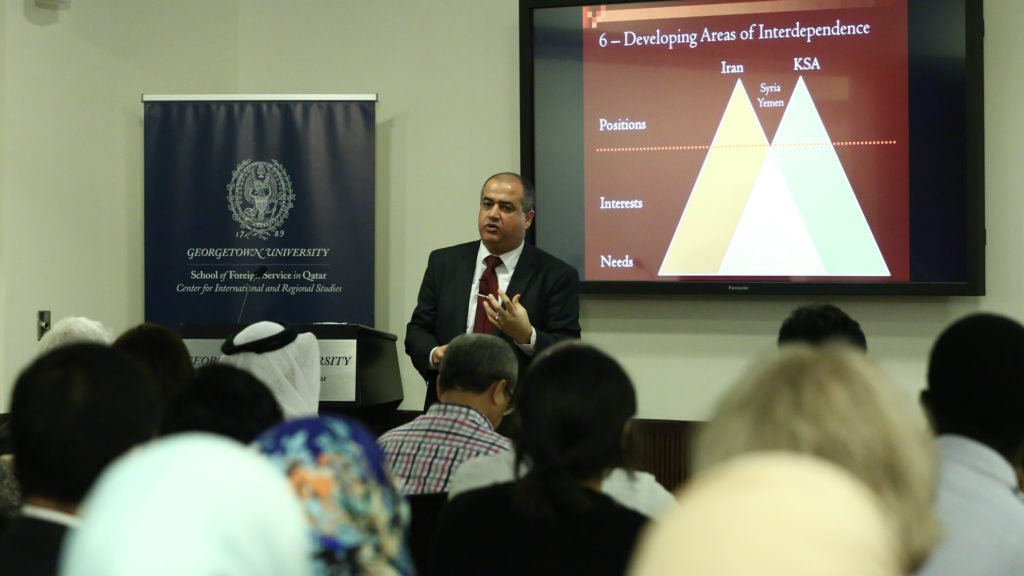Georgetown Professor Tackles Saudi-Iranian Relations at a Public Lecture

Students, scholars, and members of both the diplomatic and broader community in Qatar converged at Georgetown University in Qatar (GU-Q) to attend a vibrant Monthly Dialouge Series lecture titled “Managing the Saudi-Iranian Rivalry” delivered by Ibrahim Fraihat, a Senior Fellow in foreign policy at the Brookings Institution’s Doha Center, where he offered possible solutions to the political tensions between the two countries. The lecture series is sponsored the GU-Q’s research institute, the Center for International and Regional Studies (CIRS).
Both sides have security fears,” began Dr. Fraihat, but explained that the issue “goes well beyond the notion of a sectarian rivalry.” To underscore the limited value of explaining tensions through the prism of sectarianism, Dr. Fraihat who is also an expert in international conflict resolution and an adjunct assistant professor at GU-Q, pointed to a history between the two countries that, prior to Iran’s Islamic revolution in 1979, had enjoyed “a relationship that was neutral, if not friendly.” Relations would later plummet, he said, as Iran called for exporting the revolution to the region, followed by the Iraq war. And despite briefly warming in the 90s, the 2003 Iraq war and geopolitics of a post-Arab Spring theater of war have caused tensions to peak.
“In conflict resolution, we say if you can define specific issues, it’s a huge achievement in managing or resolving the conflict,” he said. This is why the rivalry has been particularly difficult to manage in the case of Iran and Saudi. “There is no agreement …or..one set of understanding of the conflict…even within the parties there is no clear idea.”
Despite the current diplomatic state between the two countries, Dr. Fraihat insists that conflicting positions on Syria and Yemen are stealing media headlines, when in fact areas where the two nations’ interests overlap are more prominent. And it is in these shared concerns where there is room for negotiation.
“Don’t be led or misled by the obvious positions of the two countries, because you will only see conflict. However, the positions are actually much more related,” he said. “They are both responding to security needs, as well as economic and environmental needs. Engage the security and business and define other areas of shared needs,” he urged.
Building on these mutual needs, he laid out a conflict resolution management scenario that included mediation, dialogue, confidence building measures, credible peace plans, zones of peace, developing areas of interdependence, and eventually, restoring the balance of power.
In particular, he stressed the need to go beyond top tier mediation to a grassroots level of engagement. “Ask yourself: how many Iranian students are in Qatar or other GCC countries, and how many Arabs are in Iran? How many shared exchange programs exist? How much do the two parties know about each other? To what extent are they engaged in research, media, and so forth, to build a stronger foundation and chance to reduce tension?” he asked. “We must create these links and invest on other levels with much better chance to support future collaboration.”
Commenting on Dr. Fraihat’s presentation, Dr. Mehran Kamrava, Director of CIRS, said, “The complexity of Saudi-Iranian relations are often difficult to take apart, and become entrenched in discussions of sectarian issues. Dr. Fraihat’s compelling and concise examination of a conflict that is, at its root, a familiar one for those who study geopolitics, casts much needed light on the topic, as well as brings hope that an easing of tensions is possible.”
Ibrahim Fraihat previously taught international conflict resolution at George Washington University and George Mason University. A widely published author, Dr. Fraihat’s research focuses on conflict resolution in the Arab world, with a particular emphasis on conflict management and mediation, transitions, national reconciliation, national dialogue, institutional reform, and post-conflict reconstruction.